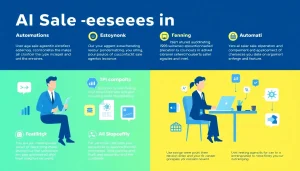Understanding the Landscape of AI Search Engines
The emergence of AI search engines marks a transformative shift in the way we interact with information online. These platforms leverage advanced artificial intelligence technologies to enhance search result accuracy, user engagement, and content relevancy, fundamentally changing the landscape of information retrieval. In this comprehensive guide, we will explore the evolution of search engines, the unique features of AI-powered platforms, and the considerable benefits they offer to users and businesses alike.
The Evolution from Traditional to AI Search
Traditional search engines, like Google and Bing, have relied primarily on algorithms that rank web pages based on keyword relevance and backlinks. While effective to a degree, this approach often leads to cumbersome user experiences—such as sifting through countless pages to find relevant results. As technology advanced, so did user expectations; people sought more intuitive, conversational interfaces that could understand context and intent.
Enter AI search engines. These systems utilize machine learning algorithms and natural language processing to analyze search queries in real-time. Instead of just returning a list of links, they attempt to comprehend the user’s intent, offering structured responses that often include direct answers, summaries, and even predictions based on previous queries. For instance, platforms like Perplexity AI exemplify this approach, merging generative AI technologies with traditional search elements to create a more user-friendly and efficient experience.
How AI is Transforming Search Results
The benefits of integrating AI into search engines are manifold. One of the most significant transformations is the ability to deliver more personalized results. AI algorithms analyze user behavior, preferences, and historical data to tailor responses uniquely suited to each individual. This hyper-personalization fosters a more engaging and relevant search experience, where users feel understood and valued.
Furthermore, AI search engines typically provide answers rather than mere links, which can save users time and streamline research processes. This change is particularly beneficial in fields requiring immediate answers, such as medical inquiries or technical troubleshooting. Studies have shown that users prefer search engines that can deliver concise answers, as they eliminate the need for further navigation, thereby increasing satisfaction.
Comparing AI Search Engine Features
Not all AI search engines are created equal; they vary significantly in the features they offer. Here are some common features to consider when comparing different platforms:
- Natural Language Processing (NLP): A hallmark of AI search engines, enabling them to process and understand human language, facilitating more accurate query interpretations.
- Conversational Interfaces: Many AI search engines employ chat-like interfaces where users can ask questions in a natural manner, often receiving answers in conversational formats instead of just links.
- Contextual Awareness: Advanced AI search engines leverage user history and contextual data to deliver hyper-relevant results tailored to individual needs.
- Data Sourcing: The capability to pull information from various sources, including real-time updates from the web, databases, and even social media, which enhances the richness of responses.
- Multimodal Search: Some platforms support not just text but also visual and audio inputs, broadening the ways users can interact with the search engine.
Key Benefits of Using AI Search Engines
Enhanced Accuracy in Search Results
One of the most significant advantages of AI search engines is their ability to deliver high-accuracy search results. Unlike traditional engines that depend heavily on keyword matches, AI-driven platforms can interpret the meaning behind queries, allowing them to produce results that are more relevant and accurate. For instance, a user searching for “best places to eat near me” is likely looking for local restaurants. An AI search engine understands that “near me” implies a geographic context and will provide listings based on the user’s location rather than simply searching for pages that include the keywords “best,” “places,” “to,” “eat,” and “near me.”
Advanced algorithms continually learn from user interactions, refining their accuracy over time. The ability to source real-time information further enhances result relevancy, providing up-to-date answers—a crucial aspect in rapidly changing fields like news and entertainment.
Improved User Engagement and Interactivity
The interactivity of AI search engines significantly improves user engagement. Traditional search engines usually provide a static list of results that requires users to click through links to find the information they need. In contrast, AI search engines offer engaging interfaces where users can ask follow-up questions, navigate multiple pathways of information, and receive tailored suggestions.
This interaction paradigm mimics conversations, allowing users to feel more connected to the searching process. Features like voice search, real-time chatbots, and graphical representations of data enhance engagement further, transforming the search experience into an exploratory journey rather than a mere task.
Real-Time Information Retrieval Advantages
AI search engines shine particularly in their ability to provide instant, real-time data retrieval. Unlike traditional engines that might yield results based on indexed data—often resulting in delays for current events or rapid updates—AI-driven platforms can aggregate information from various real-time sources, presenting the most relevant, updated data to the user.
For example, when users search for current events or trending topics, AI engines can retrieve live feeds and up-to-the-minute news articles, ensuring users receive the most recent information. This capability is essential not only for general knowledge but also for professionals who rely on timely data for decision-making.
Choosing the Right AI Search Engine for Your Needs
Evaluating Performance Metrics
When selecting an AI search engine, evaluating its performance metrics is crucial for ensuring it meets your specific needs. Several key performance indicators (KPIs) can help users understand an engine’s effectiveness:
- Accuracy Rate: Look for engines that report high accuracy in delivering relevant results for typical queries.
- Response Time: The speed of results can significantly impact user experience, especially for time-sensitive queries.
- User Retention Rate: High retention rates often indicate a satisfying user experience, where people find value in returning to the service.
- Engagement Metrics: Features such as click-through rates on answers, follow-up queries, and time spent on the platform provide insights into user interaction.
By focusing on these metrics, organizations can select a search engine that aligns with their goals—whether those are for casual use or more extensive, enterprise-level applications.
User-Focused Features to Consider
Beyond performance metrics, consider the user-centric features of each AI search engine. Key areas to investigate include:
- Personalization Options: Evaluate how well the engine tailors results to individual users based on their past search behaviors and preferences.
- User Interface Design: A clean, intuitive interface enhances the user experience and encourages prolonged interaction.
- Accessibility: Compatibility with various devices and support for multiple languages can widen user reach and engagement.
- Security and Privacy Settings: Ensure that users’ privacy is protected through robust security protocols and transparent data usage policies.
A user-friendly design with pertinent features not only enhances the search experience but can also significantly impact search success and satisfaction.
Analyzing Competitor Offerings
In a competitive landscape, comparing other AI search engines can provide valuable insights into the unique offerings of your chosen platform. Key competitors include established giants like Google and emerging players such as Perplexity AI, which offer distinctive features that cater to varying user needs.
Carrying out a comparative analysis involves examining user reviews, conducting trials, and even employing A/B testing methods on services. This analysis exposes potential advantages and disadvantages, thus informing your final decision.
Implementing AI Search Engines in Your Strategies
Integrating AI Search with Existing Tools
Successfully implementing an AI search engine within an existing ecosystem involves seamless integration with current tools and platforms. Factors to consider include:
- API Availability: Ensure the AI search engine has an API that allows easy integration with other systems.
- Compatibility with Software: The search engine should harmonize well with existing website infrastructures and software applications.
- Training and Support: Evaluate the quality of onboarding programs and ongoing support offered by the search engine provider.
A well-integrated AI search engine can drastically improve an organization’s information retrieval processes, facilitating smoother workflows and productivity.
Best Practices for Optimization
To maximize the benefits of your chosen AI search engine, consider implementing best practices as part of your optimization strategy:
- Regular Updates: Keep the system and its underlying data models updated to adapt to changing information landscapes and improve accuracy.
- User Training: Provide training sessions for users to navigate the AI search engine effectively, enhancing overall user satisfaction.
- Feedback Mechanisms: Establish channels for user feedback to address issues and identify areas for improvement, thus refining the search experience.
- Content Structuring: Ensure that content across your platforms is structured in a way that makes it easily indexable by the AI search engine.
Adhering to these practices boosts the search engine’s performance, ensuring it remains a valuable asset for your organization.
Monitoring and Adjusting Performance
Continuous monitoring of the AI search engine’s performance is crucial for its sustained success. Key practices include:
- Data Analytics: Leverage analytics tools to measure engagement, accuracy, and user retention rates regularly.
- Adjustment of Algorithms: If certain search outcomes or user engagement trends are less than optimal, consider tweaking parameters or algorithms to realign with user needs.
- Comparative Assessments: Regularly assess performance against competitors in the market and navigate shifts in user preferences and technological advancements.
By proactively monitoring and adapting to changes, organizations can ensure their AI search engine remains relevant and effective.
The Future of AI Search Engines and Digital Interactions
Anticipating Trends in AI Technology
The future of AI search engines will be heavily influenced by advancements in artificial intelligence, machine learning, and user engagement technologies. Anticipating trends can yield valuable insights into where the market is heading. Key trends include:
- Deeper Integration of AI: Continued improvements in AI capabilities will enable more sophisticated interactions, such as intuitive understanding of complex queries.
- Voice and Visual Search: With the growing popularity of voice-activated devices, the importance of optimizing for voice search and visual recognition will only increase.
- Augmented Reality Experiences: The integration of AR for immersive search experiences may become a norm, enhancing interaction with digital content.
Organizations must remain agile, preparing for and embracing these innovations as they emerge to stay ahead in the competitive landscape.
Preparing for Emerging User Expectations
User expectations continually evolve as technology advances. AI search engines must remain proactive in meeting these demands:
- Enhanced Personalization: Users will come to expect highly tailored experiences based on their behavior, preferences, and needs.
- Instant Gratification: As technology progresses, users will seek quicker and more efficient responses to their queries.
- Comprehensive Answers: Users will demand access to not just links but clear and concise answers that provide value without requiring further navigation.
By anticipating these shifting expectations, AI search engines can adapt, providing superior user experiences that drive engagement.
Possibilities for Further Innovation
The realm of AI search engines is rich with potential for innovation. Opportunities for novel features and enhanced performance include:
- Ethical AI Development: Building biases out of algorithms and ensuring fairness in search results will be crucial for long-term user trust.
- Cross-Platform Compatibility: Creating seamless experiences across different devices and integrating with multiple platforms will enhance the user journey.
- Data Visualization: Innovating ways to present search data visually can help users digest information faster and more engagingly.
Organizations that invest in and focus on these areas of innovation will not only stand out but also shape the future of digital information retrieval.






